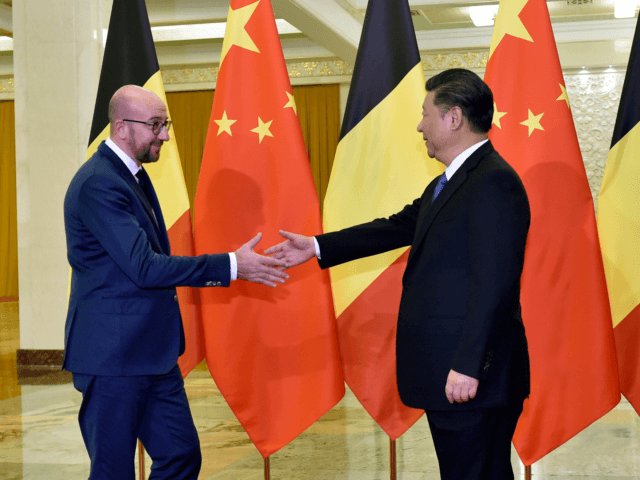The president of the European Council, Charles Michel said that Brussels will seek to increase the bloc’s “strategic autonomy” in the wake of President Joe Biden’s botched withdrawal from Afghanistan and signalled that the European Union will make a pivot towards China.
EU Council President Charles Michel said on Wednesday that he was shocked by President Biden’s withdrawal from Afghanistan was conducted with “very few—if any—consultations with their European partners,” leading the top Eurocrat to determine that Brussels should seek more independence from the strategic goals of the United States.
“The Afghan crisis only reinforces and solidifies a conviction that I have held for a while and that is shared with many others. It is the idea of European strategic autonomy, which aims at strengthening our ability to influence in accordance with our interests and values while also placing emphasis on our ability to act,” the Belgian politician told the Groupe d’études géopolitiques think tank.
Michel said that while the United States and the European Union share fundamental values, he said that it is “clear” that a divergence in implementation of these values has emerged.
“Afghanistan is a moment which must prompt us Europeans to look in the mirror and ask ourselves: ‘How can we have more influence in the geopolitical sphere in the future than we do today, and how can we act in order to influence the course of events in a direction which is compatible with our interests?” he said.
“Faced with the growing sense of chaos as the American troops were withdrawing, one cannot help but be concerned. That one of the world’s greatest economic powers such as the European Union, a democratic power which holds extremely strong values, a military power made up of twenty-seven nations, is unable to independently guarantee—without the backing of the United States— the necessary assistance to evacuate its citizens and the Afghans who supported them, must be of concern.
“In my view, this realization only makes a deeper discussion on strengthening European strategic autonomy more urgent. Now we must transform words into action.”
The “strategic autonomy”, Mr Michel spoke of will be most critical in how Brussels deals with Communist China.
Farage: European Union’s Greed Is Helping Communist China ‘Take Over the World’ https://t.co/VQphKAACee
— Breitbart London (@BreitbartLondon) January 7, 2021
From the outset, the Biden administration made it clear that one of its key foreign policy aims would be to marshal the international community, namely the EU, and build a coalition to counter the aims of Beijing. Yet, it now appears that President Biden will not be able to rely on globalist frameworks to do so.
Mr Michel said that the EU will not be “held hostage” to the rivalry between the United States and China, saying that Brussels will seek to cooperate with China on issues such as climate change and the coronavirus crisis.
“There is no doubt that we share the same democratic values and the same political model as the United States. At the same time, we must develop—as Europeans—our own strategy regarding China, which is a global power,” Michel said.
“There is the rebalancing of relations in terms of trade and, more broadly, economics. In fact, this was the purpose of the draft agreement on investments which was, in my opinion, a first step to rebalancing access to our respective markets,” he said hinting at a return to trade negotiations after months of quiet between Brussels and Beijing.
Merkel Makes Clear That Germany Will Not Help U.S. in China Trade Fight https://t.co/mD8I0wy1gu
— Breitbart London (@BreitbartLondon) January 17, 2020
The notion from the Biden administration that it would be able to rely on European allies to counter China may have been delusional even before the souring of relationships after the fall of Afghanistan to the Taliban.
Indeed, the EU has long sought to develop deeper trade relations with the communist regime in Beijing, which overtook the United States as its top trading partner last year.
Shortly before Mr Biden’s inauguration as president, the European Union agreed in principle to a massive investment pact, which was ultimately put on hold after a series of tit-for-tat sanctions from the EU and China.
While Mr Michel said in his interview on Wednesday that the EU would seek to confront the communist nation on human rights abuses, the draft trade proposal he referenced failed to require that the Chinese government stamp out modern slavery, or even mention the words Xinjiang or Hong Kong.
German Retailers Hugo Boss, Aldi, and Lidl Accused of Benefiting from Chinese Concentration Camp Labour https://t.co/51sLJBNNmv
— Breitbart London (@BreitbartLondon) September 8, 2021
Follow Kurt Zindulka on Twitter here @KurtZindulka

COMMENTS
Please let us know if you're having issues with commenting.